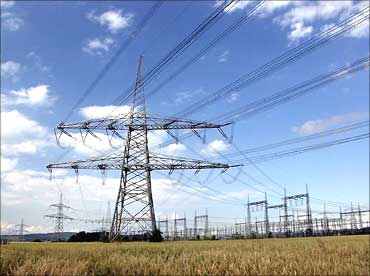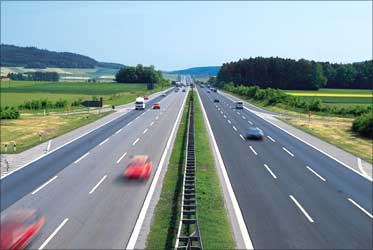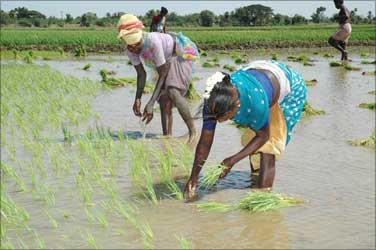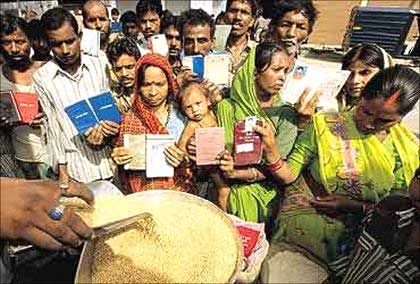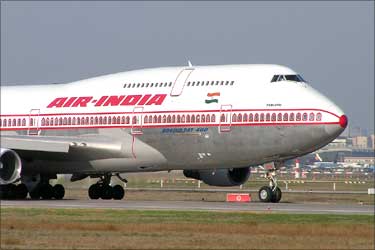 | « Back to article | Print this article |
What about infrastructure, Mr Prime Minister?
Just a day after Prime Minister Manmohan Singh held a press conference to commemorate the 1st anniversary of the United Progressive Alliance-II government, India's main Opposition party -- the Bharatiya Janata Party -- issued a statement slamming both the prime minister and the government at the Centre for poor performance across sectors.
Following is the text of the statement issued by the BJP:
Though Prime Minister Manmohan Singh addressed the press conference yesterday (on Monday) on the completion of the 1st year of UPA II yet, we cannot ignore the fact that now Dr Singh has entered the seventh year as the prime minister of India.
Proper growth of infrastructure sector is critical for development and it is indeed surprising that the prime minister in his press conference yesterday was conspicuously silent or evasive on critical issues relating to this sector.
The country expected the prime minister to outline his strategies for accelerating growth in this sector, how he proposes to remove the bottlenecks and bring about clarity on issues so that the country is made aware of the roadmap.
Nothing like this happened and it was an utter disappointment to see the prime minister not touching these issues at all.
The BJP wishes to highlight the critical gaps in some of the crucial areas pertaining to infrastructure and other relevant sectors.
Click on NEXT to read more...
What about infrastructure, Mr Prime Minister?
Power sector
The entire power sector is in a real mess. Generation is going down and in adjoining Gurgaon (near Delhi), in and around the millennium city, which houses the office of so many MNCs there is power cut for 10-12 hours every day and it is hardly 10-15 km away from Delhi.
In fact, the Prime Minister's Office itself is aware of the highly unsatisfactory performance of the power ministry. The copy of the internal note dated June 30, 2009, prepared by the director in the PMO and approved at the level of the principal secretary (copy of which was procured under the Right to Information Act), clearly shows that the PMO took a very grim view of the performance of the power ministry.
Some of the comments made in the note are as follows:
The five-year period 1998-2003 (during National Democratic Alliance regime) saw the ministry of power play a pivotal role in the reforms process culminating in the bipartisan support for the Electricity Act 2003. The subsequent five years (UPA regime) can only be called 'a half decade of missed opportunities', as the reforms impetus was virtually abandoned.
Having conspicuously failed to add even 50 per cent of the target capacity of 44,000 MW in the Tenth Five-Year Plan, the leaders of the sectors, pitched for an absurdly high target of 78,000 MW in the Eleventh (Plan).
Put together the power sector under-performed. In fact, persistent shortfalls on account of electricity generation held back our GDP growth.
The country expected the prime minister to come out with his roadmap about improving and clearing the mess in the power sector but there was complete silence.
Click on NEXT to read more...
What about infrastructure, Mr Prime Minister?
The National Highway Projects (the road sector)
It is too well known that the National Highway Projects, one of the greatest success stories of the National Democratic Alliance government came to a halt during the entire tenure of UPA I when Road Transport Minister T R Balu ran the department in a whimsical manner.
There were allegation of corruption and nepotism and five chairmen of NHAI (National Highway Authority of
India) were changed in two years leading to adverse comments also from the courts.
During the NDA regime, 11 km of road was being constructed everyday. Kamal Nath -- the new minister in UPA II -- boastfully declared that now under his leadership 20 km of road would be constructed per day but the target was rarely met and the old style of interference, ad hoc decisions, not always on transparent considerations came to the fore.
Now, the Planning Commission has revised the target from 20 km per day to a mere 6 km per day. Kamal Nath said that the Planning Commission was indulging in jugglery of statistics.
It is, thus, evident that two authorities of the same government were speaking in different voices. It was expected from the prime minister to clarify things to remove the uncertainty into such a critical area of infrastructure but he chose to remain silent again.
Click on NEXT to read more...
What about infrastructure, Mr Prime Minister?
Agriculture sector
The agriculture sector constitutes nearly 17 per cent of the GDP but nearly 70 per cent of the population is dependent upon this sector. This sector is already reeling under inflationary impact.
Agriculture income is sliding and the projection for the year 2009-10 to be released shortly in all likelihood is going
to project minus 0.2 per cent.
It was expected from the prime minister to speak about the glaring problems of this sector and unveil his own plan for this sector because agriculture growth is essential for real growth with equity.
Click on NEXT to read more...
What about infrastructure, Mr Prime Minister?
Confusion over the exact number of BPL families
This is another area over which confusion and uncertainty loom large. The knowledge of the exact number of BPL (below poverty line) families is crucial to a whole range of social development programmes, including food security.
As per the Planning Commission, 27.3 per cent of the rural household are living below the poverty line. The expert group headed by N C Saxena was appointed by the government to conduct a survey and declare the exact number of BPL households eligible for the ministry of rural development scheme.
Based upon calorie intake this committee estimated that 50 per cent of rural households are living below the poverty line.
Another expert group, The National Commission for Enterprises in the Unorganised Sector headed by Arjun
Sen Gupta, found that 77 per cent of the population lived on less than Rs 20 a day therefore this should be the basis for the BPL sector.
The Suresh Tendulkar Committee concluded that 37.2 per cent of the country's population is below the poverty line. It is to be recalled that United Nations Development Index has placed India at a rank of 132 -- even below Bhutan.
The Global Hunger Index of the International Food Policy Research has placed India at the 65th position from amongst 88 developing countries.
It was very important for the prime minister to clarify which report was being followed by the government. State governments themselves have come with their own version of BPL and extreme BPL for the Antyodaya Ann Yojna.
Obviously, any notion of food security would be meaningless unless there is clarity about the exact number of BPL families.
Click on NEXT to read more...
What about infrastructure, Mr Prime Minister?
The Air India mess
Air transport constitutes a very important area of infrastructure. It is now evidently clear that under the UPA we have seen the demise of Air India.
In the year 2007, the merger of Indian Airlines and Air India was done and based upon the reports of the consultant we were told that the new merged entity would make a saving of Rs 500 crore (Rs 5 billion) every year.
Leave aside any turnaround, post-merger the accumulated loss of Air India today stands at Rs 7,200 crore (Rs 72 billion) and is likely to become Rs 10,000 crore (Rs 100 billion) by the next year.
Should someone not take the responsibility for this mess more particularly when the entire airlines sector is showing signs of recovery?
The above are critical areas of infrastructure and growth. The prime minister was expected to explain the critical gaps in these areas but he chose to remain either silent or evasive.
The second press conference of Dr Manmohan Singh during the last six years of the UPA government was indeed an utter disappointment.

